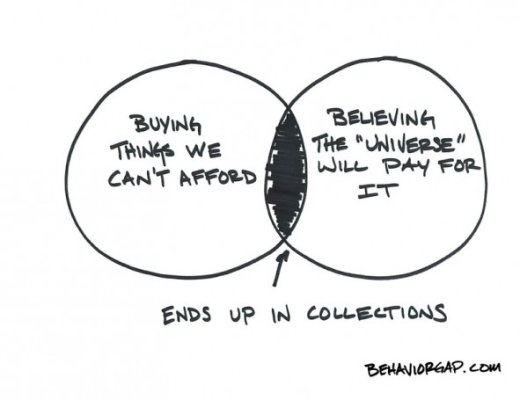I felt we could afford around $350,000. We called a real estate agent named Mitch, who had signs on all the bus stops: Talk to Mitch! He picked us up in a gold Jaguar, and suddenly we were looking at houses that listed at $500,000 or more.
It felt a little crazy to be shopping for houses that cost half a million dollars, but my income was growing rapidly. Everywhere I looked, people were being rewarded for buying as much house as they could possibly afford, and then some. There was this excitement in the air, almost like static. I started to think that if I didn’t buy a house right then, I would never be able to afford one.
I can certainly relate... luckily for me, the stability of my job market as well as our 'quick' learning lead us towards a much more manageable situation. We never lost our home and we're doing extremely well today...
DW and I were 21 and 22 at the time we signed the papers for our $518,000 house (well actually a townhouse) to be built between January-May 2005. We were both in school full time and going to graduate in May. House was going to close May 28th, and our wedding was set for June 3rd. I had a dozen job offers I was deciding between to start in mid June (all ranging between $57,000-$85,000). I had never made more than $9,000 a year myself up to that point.
We put down 5% (or $25,900) more then half of which was an early graduation gift from my grandparents. The rest came from savings I'd accumulated working internships over the previous 3 summers.
So there we were... two 'kids' (or adults I suppose technically) about to leave the college atmosphere and enter the real world. A family friend was representing us as our realtor and had convinced us that if we didn't purchase a house now we'd have to wait until our 30's to get in at a much higher price. I didn't know until years later that she received a 3% commission from the builder... I always thought she was working with us for free. I'd estimate she spent about a total of 10 hours of work (showing and paperwork) on us as clients... not a bad paycheck, about $1,800 an hour.
I asked all the right questions:
"How can we afford this when I don't even work yet?" [
"stated income... duh"]
"What happens if I lost my job in a few months/years?" [
"sell the house for a huge profit"]
"I noticed the housing market has skyrocketed recently, how can this possibly continue?" [
"everyone needs a house and the housing market is always going up"]
We were introduced to the builders lender. If we used him, we got a free $15,000 on upgrades, nicer kitchen, hardwood floors, etc...).
"This is how it is done..."
"Just use the highest job offer you have... and make an assumption on how much your wife will be making"
"Everyone does it this way... if you don't you can't get a house"
"Call me in 6 months and we'll refinance you into a 30 year fixed... if you're really worried about the rate changing."
"You are approved for a 5:1 ARM up to $550,000... congrats!"
"Can I get a 30 year fixed instead?" [
"not without paperwork showing your income and putting more down... which would be silly to do"]
Yep... we were told by the 'professional' that it was
silly to put down more than 5% on a house.

It is easy to look back now and think how foolish I (a millions of others) were with housing at the time.
Luckily today we're still in the same house and still love the place as much as the day we purchased it. We've paid our mortgage down to $365,900 and the house is currently worth about $430,000 according to Zillow. We're in a 30 year fixed
Certainly would have been much easier and less stressful ways to get from then to now (we've paid $201,400 in interest alone over the last 7 years... most of the $126,000 in principle that was paid down was additional payments and brought to the table at refinancing). We sometimes wonder what situation we'd be in if we had rented the last 7 years and saved on the side... how much we'd afford today. Oh well...
luckily we came out on the right side of this one, and learned an incredible amount about our financial health while side stepping many landmines.
live and learn...



